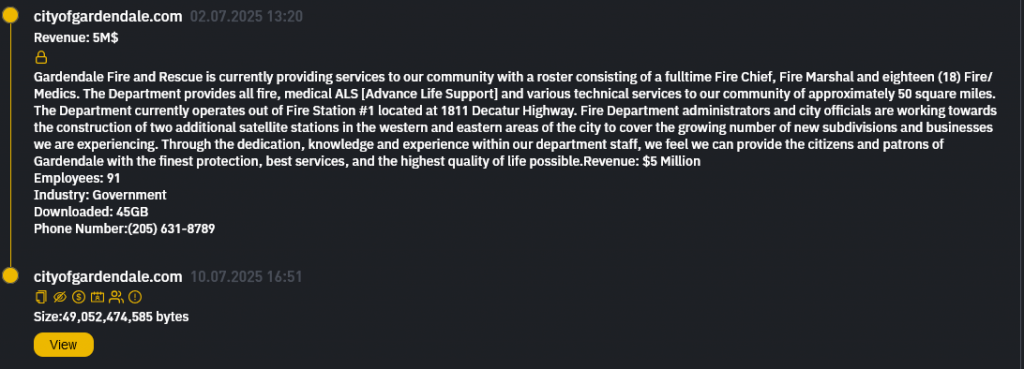INC Ransom Claims Breach of Gardendale City Systems, Exposes Sensitive Data
A ransomware group known as INC Ransom has listed the City of Gardendale, Alabama, as its latest victim on its dark web leak site, claiming to have exfiltrated nearly 50GB of sensitive files. The disclosure is part of the group’s ongoing strategy to publicly name and pressure organizations into paying ransom demands.
Gardendale, a city of just over 16,000 residents and a northern suburb of Birmingham, is now at the center of a growing cybersecurity concern. According to the attackers’ post, the stolen trove allegedly contains:
- Financial records and contracts
- Human resources documents
- Incident reports
- Customer and citizen information

Despite the severity of the claim, the hackers did not provide any sample files or screenshots to verify the breach. The city administration has yet to publicly respond to the allegation. Confirmation of such a breach could have wide-ranging implications for both municipal operations and resident privacy.
If the data theft is verified, citizens may face elevated risks of identity theft. Moreover, attackers could use the exposed data to launch more sophisticated intrusions into city infrastructure or other connected systems.
INC Ransom’s Expanding Victim List Includes Governments, Healthcare, and Even Cemeteries
INC Ransom, first spotted in July 2023, has rapidly gained notoriety in the ransomware landscape. The group has claimed responsibility for attacks on:
- Stark AeroSpace, a defense contractor for the U.S. Department of Defense
- The City of Leicester in England
- San Francisco Ballet
- NHS Dumfries and Galloway (Scotland)
- Xerox Corporation
- Catholic Cemeteries of the Diocese of Hamilton, Canada
The group appears indiscriminate in its targeting, striking both public and private sector organizations with equal aggression.
According to Ransomlooker, INC Ransom has breached at least 176 organizations over the past year alone.
The listing of Gardendale signals continued interest by ransomware gangs in targeting smaller municipalities, which may lack the cybersecurity defenses of larger cities or enterprises but still hold sensitive citizen data.
As of now, no ransom demand has been publicly disclosed, and no timeline has been provided for the potential release of the allegedly stolen data.









